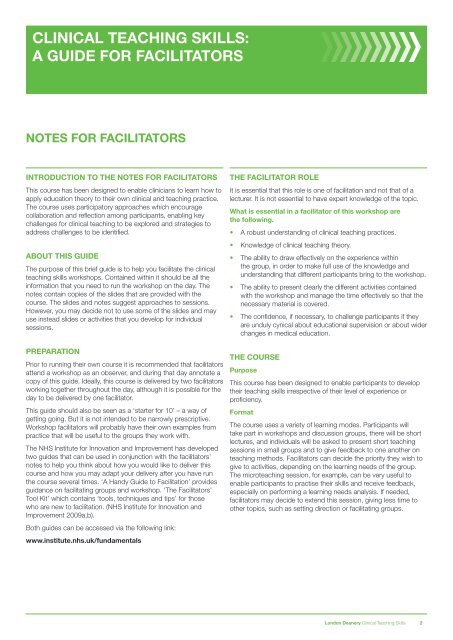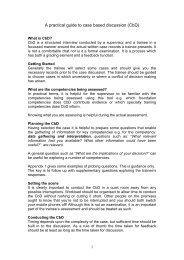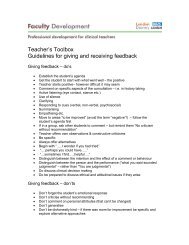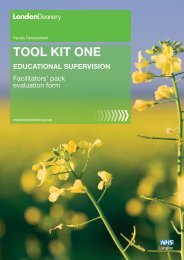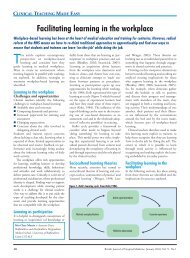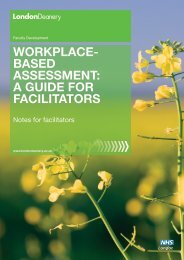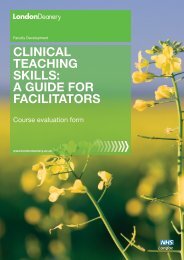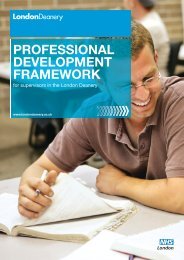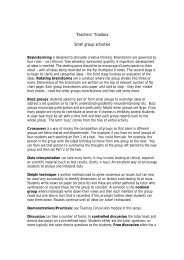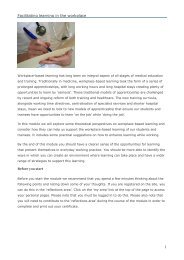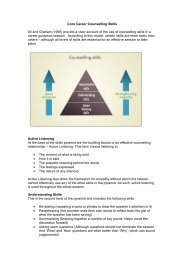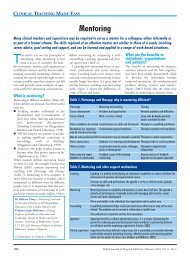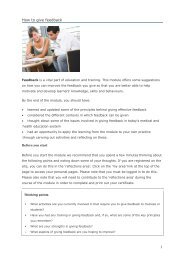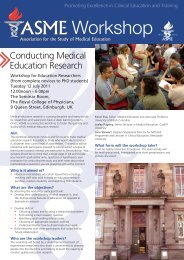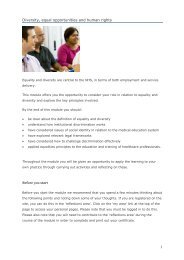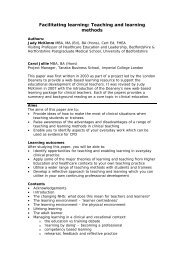A GuIdE for fACILITATorS - Faculty Development - London Deanery
A GuIdE for fACILITATorS - Faculty Development - London Deanery
A GuIdE for fACILITATorS - Faculty Development - London Deanery
You also want an ePaper? Increase the reach of your titles
YUMPU automatically turns print PDFs into web optimized ePapers that Google loves.
Clinical Teaching Skills:<br />
A GUIDE FOR FACILITATORS<br />
notes <strong>for</strong> Facilitators<br />
Introduction to THE NOTES FOR facilitators<br />
This course has been designed to enable clinicians to learn how to<br />
apply education theory to their own clinical and teaching practice.<br />
The course uses participatory approaches which encourage<br />
collaboration and reflection among participants, enabling key<br />
challenges <strong>for</strong> clinical teaching to be explored and strategies to<br />
address challenges to be identified.<br />
About this guide<br />
The purpose of this brief guide is to help you facilitate the clinical<br />
teaching skills workshops. Contained within it should be all the<br />
in<strong>for</strong>mation that you need to run the workshop on the day. The<br />
notes contain copies of the slides that are provided with the<br />
course. The slides and notes suggest approaches to sessions.<br />
However, you may decide not to use some of the slides and may<br />
use instead slides or activities that you develop <strong>for</strong> individual<br />
sessions.<br />
Preparation<br />
Prior to running their own course it is recommended that facilitators<br />
attend a workshop as an observer, and during that day annotate a<br />
copy of this guide. Ideally, this course is delivered by two facilitators<br />
working together throughout the day, although it is possible <strong>for</strong> the<br />
day to be delivered by one facilitator.<br />
This guide should also be seen as a ‘starter <strong>for</strong> 10’ – a way of<br />
getting going. But it is not intended to be narrowly prescriptive.<br />
Workshop facilitators will probably have their own examples from<br />
practice that will be useful to the groups they work with.<br />
The NHS Institute <strong>for</strong> Innovation and Improvement has developed<br />
two guides that can be used in conjunction with the facilitators’<br />
notes to help you think about how you would like to deliver this<br />
course and how you may adapt your delivery after you have run<br />
the course several times. ‘A Handy Guide to Facilitation’ provides<br />
guidance on facilitating groups and workshop. ‘The Facilitators’<br />
Tool Kit’ which contains ‘tools, techniques and tips’ <strong>for</strong> those<br />
who are new to facilitation. (NHS Institute <strong>for</strong> Innovation and<br />
Improvement 2009a,b).<br />
Both guides can be accessed via the following link:<br />
www.institute.nhs.uk/fundamentals<br />
The facilitator role<br />
It is essential that this role is one of facilitation and not that of a<br />
lecturer. It is not essential to have expert knowledge of the topic.<br />
What is essential in a facilitator of this workshop are<br />
the following.<br />
• A robust understanding of clinical teaching practices.<br />
• Knowledge of clinical teaching theory.<br />
• The ability to draw effectively on the experience within<br />
the group, in order to make full use of the knowledge and<br />
understanding that different participants bring to the workshop.<br />
• The ability to present clearly the different activities contained<br />
with the workshop and manage the time effectively so that the<br />
necessary material is covered.<br />
• The confidence, if necessary, to challenge participants if they<br />
are unduly cynical about educational supervision or about wider<br />
changes in medical education.<br />
The course<br />
Purpose<br />
This course has been designed to enable participants to develop<br />
their teaching skills irrespective of their level of experience or<br />
proficiency.<br />
Format<br />
The course uses a variety of learning modes. Participants will<br />
take part in workshops and discussion groups, there will be short<br />
lectures, and individuals will be asked to present short teaching<br />
sessions in small groups and to give feedback to one another on<br />
teaching methods. Facilitators can decide the priority they wish to<br />
give to activities, depending on the learning needs of the group.<br />
The microteaching session, <strong>for</strong> example, can be very useful to<br />
enable participants to practise their skills and receive feedback,<br />
especially on per<strong>for</strong>ming a learning needs analysis. If needed,<br />
facilitators may decide to extend this session, giving less time to<br />
other topics, such as setting direction or facilitating groups.<br />
<strong>London</strong> <strong>Deanery</strong> Clinical Teaching Skills<br />
2


